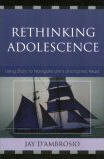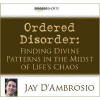I tell you, Peter, before the rooster crows today, you will deny three times that you know me. -
Luke 22:34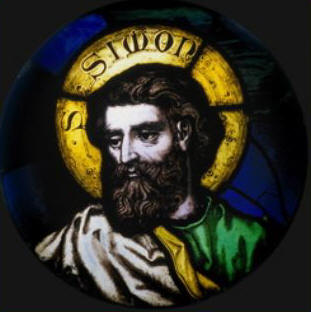
Peter was the fiery fisherman who followed Jesus with a passion. He wore his heart on his sleeves and often said things he later regretted. He was also known as Simon, son of Jonah. Remember that Christ's death, burial, and resurrection were often compared to the story of Jonah who endured three days in the belly of the whale. While his father and the Jonah of biblical epic were two entirely different men, we will see that there is a metaphorical similiarity between Peter and Jonah.
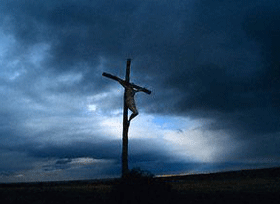
Jesus was physically crucified, bearing the bitter agony of the sins of the world upon himself. He was nailed to the cross with
three nails, one through each hand and one through both feet...keep that in mind. He died, was sealed in the tomb, and rose again on the third day, unveiling a new hope for all humanity. While Jesus was traveling his dark path, Peter too was experiencing a crucifixion on the level of the soul, a death of his own making.
When Jesus was handed over to the authorities, Peter waited outside to hear any news of his master's fate.
Then seizing him, they led him away and took him into the house of the high priest. Peter followed at a distance. But when they had kindled a fire in the middle of the courtyard and had sat down together, Peter sat down with them. A servant girl saw him seated there in the firelight. She looked closely at him and said, "This man was with him." But he denied it. "Woman, I don't know him," he said. -
Luke 22:54-57Peter's heart had just been pierced by the first nail.
A little later someone else saw him and said, "You also are one of them." "Man, I am not!" Peter replied. -
Luke 22:58The second nail was pounded through.
About an hour later another asserted, "Certainly this fellow was with him, for he is a Galilean." Peter replied, "Man, I don't know what you're talking about!" Just as he was speaking, the rooster crowed. The Lord turned and looked straight at Peter. Then Peter remembered the word the Lord had spoken to him: "Before the rooster crows today, you will disown me three times." And he went outside and wept bitterly. -
Luke 22:59-62
The third nail impaled his heart with such force that Peter wept aloud. He was crucified, maybe not literally but his heart knew the truth. His Lord was crucified on Golgotha with criminals, writhing in agony. Peter was on the streets with criminals, writhing from inner agony. He had disowned his master and friend in his hour of greatest need. He had lost hope, friendship, and his courage in three hammer blows. Just like Jonah, he had been swallowed by the whale that had been lurking in the depths of his soul.
Imagine the next morning and the morning after that. The crowing of roosters must have felt like salt poured into searing wounds, again reminding him of his failure and denial. He was in Hell, the outer darkness, where, as C.S. Lewis declared, being fades away into non-entity. Then came Sunday...
The tomb of Christ was empty. An angel appeared exclaiming that he had risen, just as he said he would! The disciples were amazed when Jesus manifested his presence among them. Peter, however, was still in the belly of the whale.
Peter, Thomas (called Didymus), Nathanael from Cana in Galilee, the sons of Zebedee, and two other disciples were together. "I'm going out to fish," Simon Peter told them, and they said, "We'll go with you." So they went out and got into the boat, but that night they caught nothing. -
John 21:1-3Nothing could erase the pain he had caused. The old fisherman would have to bear this the rest of his life. He decided to leave the fellowship and return to fishing, to go it alone in the world. He had returned to his old pursuits. Envision Peter near the bow of the boat, staring blankly toward the shore, feeling lost and alone in the morning fog.
Early in the morning, Jesus stood on the shore, but the disciples did not realize that it was Jesus. He called out to them, "Friends, haven't you any fish?" "No," they answered. He said, "Throw your net on the right side of the boat and you will find some." When they did, they were unable to haul the net in because of the large number of fish. -
John 21:1-3Just as Jesus had called him all those years ago, so too was he being called now.
Then the disciple whom Jesus loved said to Peter, "It is the Lord!" As soon as Simon Peter heard him say, "It is the Lord," he wrapped his outer garment around him (for he had taken it off) and jumped into the water. -
John 21:7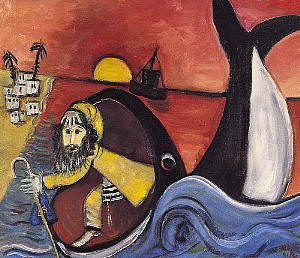
Peter's heart burned within him. He knew where his heart was and in a beautifully Forest Gump-like moment, jumps off the boat while it is still out to sea. Just as Jonah was vomited upon the beach after his time in the belly of the whale, Peter swims ashore, crawls out on the sand, and sits down to breakfast with Jesus. The three nail wounds still ache in his soul...and Jesus knows this.
When they had finished eating, Jesus said to Simon Peter, "Simon son of Jonah, do you truly love me more than these?" "Yes, Lord," he said, "you know that I love you." Jesus said, "Feed my lambs." -
John 21:15Jesus doesn't hesitate. Had he left the old fisherman wounded, it would have been a scourge upon the rest of his life. He removes the first nail.
Again Jesus said, "Simon son of Jonah, do you truly love me?" He answered, "Yes, Lord, you know that I love you." Jesus said, "Take care of my sheep." -
John 21:16The second nail is removed.
The third time he said to him, "Simon son of Jonah, do you love me?" Peter was hurt because Jesus asked him the third time, "Do you love me?" He said, "Lord, you know all things; you know that I love you." Jesus said, "Feed my sheep. I tell you the truth, when you were younger you dressed yourself and went where you wanted; but when you are old you will stretch out your hands, and someone else will dress you and lead you where you do not want to go." Jesus said this to indicate the kind of death by which Peter would glorify God. Then he said to him, "Follow me!" -
John 21:17-19The third and deepest nail was pulled out...it hurts. It always does, but Peter's resurrection was complete. The old man had been crucified with Christ and now only the new man remained. Jesus foreshadows Peter's own death by inverted crucifixion, but it does not matter. Peter was now truly, as Jesus had named him, the Rock. He had been through fire, death, and water. What could man do to him? He was unstopable, unbreakable.
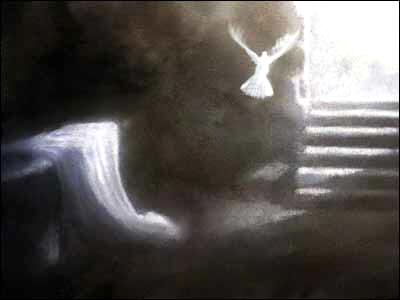
What nails need to be pulled out of your heart? What cross do you bear? Often we build up walls around our wounded parts to protect them, but the wounds do not heal. In essence, we create our own tomb. How have you created a tomb around your heart? Do you need to experience a resurrection in your life right now? Easter reminds us that there is hope in the midst of great darkness.
Labels: Bible, Christ, cross, crucifixion, Easter, Jesus, Jonah, metaphor, Peter, resurrection, whale
 By the time Trent had reached middle school, he knew beyond a shadow of a doubt that he would have a difficult row to hoe. He was fairly overweight, and to say that he had a poor complexion would have been an understatement. If you were to make an honest assessment of the situation, you would see that Trent had only one or two friends (if you could call them that) in the whole school. Each day, he awoke with a sickening feeling in his gut, knowing the teasing and tormenting that awaited him upon his arrival to school. “Fat ass!” “Pizza face!” “Wide load!” He tried to ignore the comments as his parents had suggested, but deep down, each unkind word cut deep into his heart. His parents were very loving and did the best they could, but the fiery words of his peers did their damage with alarming precision. The enemy was driving a spear deeper and deeper into Trent’s soul.
By the time Trent had reached middle school, he knew beyond a shadow of a doubt that he would have a difficult row to hoe. He was fairly overweight, and to say that he had a poor complexion would have been an understatement. If you were to make an honest assessment of the situation, you would see that Trent had only one or two friends (if you could call them that) in the whole school. Each day, he awoke with a sickening feeling in his gut, knowing the teasing and tormenting that awaited him upon his arrival to school. “Fat ass!” “Pizza face!” “Wide load!” He tried to ignore the comments as his parents had suggested, but deep down, each unkind word cut deep into his heart. His parents were very loving and did the best they could, but the fiery words of his peers did their damage with alarming precision. The enemy was driving a spear deeper and deeper into Trent’s soul. This newfound activity was a fantasy adventure game that involved some pretty graphic violence. Trent found himself wanting to spend more and more time playing the game, rather than doing other things in the “real world.” His parents soon noticed that he was spending no fewer than five hours every day playing this game and was interacting with his family less and less. At dinnertime, his mother, father, and older sister would take turns trying to start discussions with Trent about things at school or his life in general, but he didn’t have much to say, for his life was beginning to revolve around the game and the fantasy characters that inhabited this virtual world.
This newfound activity was a fantasy adventure game that involved some pretty graphic violence. Trent found himself wanting to spend more and more time playing the game, rather than doing other things in the “real world.” His parents soon noticed that he was spending no fewer than five hours every day playing this game and was interacting with his family less and less. At dinnertime, his mother, father, and older sister would take turns trying to start discussions with Trent about things at school or his life in general, but he didn’t have much to say, for his life was beginning to revolve around the game and the fantasy characters that inhabited this virtual world. What did the video game offer that reality did not? During the hours that he played the game, Trent could forget about the painful reality he faced day in and day out. The game was, in essence, an opiate. It offered the feeling of power and courage without really requiring anything of him. He was willing to take incredible risks as Zax, such as single-handedly infiltrating the orbiting battle station of an alien invasion force. In real life, meanwhile, Trent rarely took risks and avoided situations where he was sure to be harassed, such as school dances, rest rooms, and stairwells. The game also offered him the illusion of something that is deep in the heart of every boy: adventure and the chance to play the hero. A recent study publicized by BBC News found that nearly a third of all students were playing video games daily, and that close to 10 percent played for at least thirty hours each week! In this example, Trent found himself acting more and more like the entranced lotus-eaters of Homeric epic.
What did the video game offer that reality did not? During the hours that he played the game, Trent could forget about the painful reality he faced day in and day out. The game was, in essence, an opiate. It offered the feeling of power and courage without really requiring anything of him. He was willing to take incredible risks as Zax, such as single-handedly infiltrating the orbiting battle station of an alien invasion force. In real life, meanwhile, Trent rarely took risks and avoided situations where he was sure to be harassed, such as school dances, rest rooms, and stairwells. The game also offered him the illusion of something that is deep in the heart of every boy: adventure and the chance to play the hero. A recent study publicized by BBC News found that nearly a third of all students were playing video games daily, and that close to 10 percent played for at least thirty hours each week! In this example, Trent found himself acting more and more like the entranced lotus-eaters of Homeric epic.

 The gods sent their messenger from Mount Olympus to talk sense into Calypso and get her to free the despairing Odysseus. We adult leaders will sometimes have to intervene in an unhealthy adolescent relationship. Remember that it is important to continually invest in your own relationships with students so that when the time comes to engage their story in a meaningful way, your advice and guidance will be taken to heart and not summarily dismissed.
The gods sent their messenger from Mount Olympus to talk sense into Calypso and get her to free the despairing Odysseus. We adult leaders will sometimes have to intervene in an unhealthy adolescent relationship. Remember that it is important to continually invest in your own relationships with students so that when the time comes to engage their story in a meaningful way, your advice and guidance will be taken to heart and not summarily dismissed.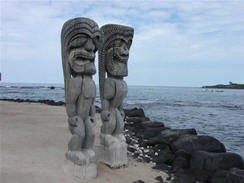 To the Hawaiians, it was very important to maintain a balance between the worlds of males and females. They referred to this balance as pono, meaning “correctness.” One should not dominate or control the other, as this was not the way of nature. Seeking something that cannot be found in a human relationship, such as the meaning of life and healing for the soul, would qualify as an imbalance and would lead to problems.
To the Hawaiians, it was very important to maintain a balance between the worlds of males and females. They referred to this balance as pono, meaning “correctness.” One should not dominate or control the other, as this was not the way of nature. Seeking something that cannot be found in a human relationship, such as the meaning of life and healing for the soul, would qualify as an imbalance and would lead to problems.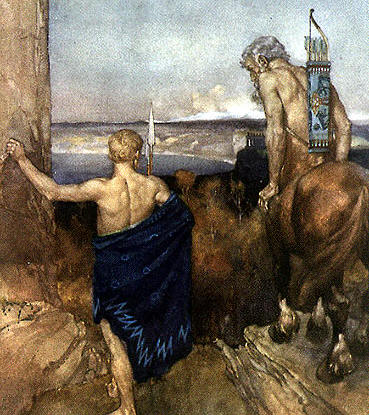 Be intentional about building relationships with students. The last thing a student wants is unsolicited advice or assistance from an adult who has never bothered to get to know them. Adult relationships typically evolve over a period of time and require quite a few conversations and shared experiences before there is a willingness to be vulnerable and open. Adolescents are somewhat different in this respect. It is possible to build fairly strong relationships in a relatively short period of time.
Be intentional about building relationships with students. The last thing a student wants is unsolicited advice or assistance from an adult who has never bothered to get to know them. Adult relationships typically evolve over a period of time and require quite a few conversations and shared experiences before there is a willingness to be vulnerable and open. Adolescents are somewhat different in this respect. It is possible to build fairly strong relationships in a relatively short period of time.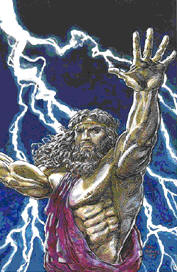 How was Odysseus freed from his captivity on Calypso’s island? Keep in mind, Odysseus had fallen into despair, resigning to the fact that he would never again see his cherished homeland of Ithaca. The mighty hero was in a helpless situation. Intervention had to come from outside the island, from Zeus himself. Why did the gods intervene in this situation? Because they heard the cries of Odysseus and decided to once again step into his story.
How was Odysseus freed from his captivity on Calypso’s island? Keep in mind, Odysseus had fallen into despair, resigning to the fact that he would never again see his cherished homeland of Ithaca. The mighty hero was in a helpless situation. Intervention had to come from outside the island, from Zeus himself. Why did the gods intervene in this situation? Because they heard the cries of Odysseus and decided to once again step into his story. Just as the gods noticed the tears of Odysseus, we as adult leaders need to be aware of changes in our students’ behavior. Is a normally happy and upbeat girl now depressed and teary-eyed? Is a boy who is normally talkative suddenly quiet? Is an easygoing student becoming touchy and irritable? Granted, there could be many reasons for such a change, but pay attention to who it is they are spending time with.
Just as the gods noticed the tears of Odysseus, we as adult leaders need to be aware of changes in our students’ behavior. Is a normally happy and upbeat girl now depressed and teary-eyed? Is a boy who is normally talkative suddenly quiet? Is an easygoing student becoming touchy and irritable? Granted, there could be many reasons for such a change, but pay attention to who it is they are spending time with. If you are a teacher or school counselor, spend time in the hallways or the cafeteria. You would be amazed at what you can learn from time spent daily in the hallways between classes or in the cafeteria during lunch. If you are a coach, pay attention to what is discussed in the locker room or on the field. There you will find adolescents at their most unvarnished. Try to notice who students sit with during unstructured time. This may sound sneaky, but listen in on their conversations. Remember that this is a war for the hearts of the young people in our care! This will reveal a great deal about what is happening in their lives and give you clues as to how you can intervene in destructive relationships.
If you are a teacher or school counselor, spend time in the hallways or the cafeteria. You would be amazed at what you can learn from time spent daily in the hallways between classes or in the cafeteria during lunch. If you are a coach, pay attention to what is discussed in the locker room or on the field. There you will find adolescents at their most unvarnished. Try to notice who students sit with during unstructured time. This may sound sneaky, but listen in on their conversations. Remember that this is a war for the hearts of the young people in our care! This will reveal a great deal about what is happening in their lives and give you clues as to how you can intervene in destructive relationships. William Shakespeare warns us about the dangers of young “love” in his play Romeo and Juliet. He tells the story of two young people who fall in love in the midst of a war between their families. Romeo is a Montague, while Juliet is a Capulet. They chase each other with a passion, but in the end, their unrelenting infatuation leads to their demise.
William Shakespeare warns us about the dangers of young “love” in his play Romeo and Juliet. He tells the story of two young people who fall in love in the midst of a war between their families. Romeo is a Montague, while Juliet is a Capulet. They chase each other with a passion, but in the end, their unrelenting infatuation leads to their demise.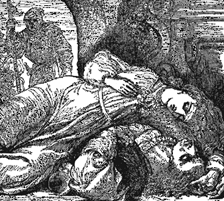 The star-crossed lovers believed that the answers they sought could be found in the other person. When Romeo believed that Juliet had died, he ended his own life. When Juliet awoke from her deathlike sleep, she committed suicide after realizing that Romeo had taken his life. This play is rightly described as a tragedy! How many adolescent suicides, bouts of depression, and insecurities today are related to lost love, and to the perception that the answers to life’s questions and the source of healing have been lost?
The star-crossed lovers believed that the answers they sought could be found in the other person. When Romeo believed that Juliet had died, he ended his own life. When Juliet awoke from her deathlike sleep, she committed suicide after realizing that Romeo had taken his life. This play is rightly described as a tragedy! How many adolescent suicides, bouts of depression, and insecurities today are related to lost love, and to the perception that the answers to life’s questions and the source of healing have been lost? Peter was the fiery fisherman who followed Jesus with a passion. He wore his heart on his sleeves and often said things he later regretted. He was also known as Simon, son of Jonah. Remember that Christ's death, burial, and resurrection were often compared to the story of Jonah who endured three days in the belly of the whale. While his father and the Jonah of biblical epic were two entirely different men, we will see that there is a metaphorical similiarity between Peter and Jonah.
Peter was the fiery fisherman who followed Jesus with a passion. He wore his heart on his sleeves and often said things he later regretted. He was also known as Simon, son of Jonah. Remember that Christ's death, burial, and resurrection were often compared to the story of Jonah who endured three days in the belly of the whale. While his father and the Jonah of biblical epic were two entirely different men, we will see that there is a metaphorical similiarity between Peter and Jonah. Jesus was physically crucified, bearing the bitter agony of the sins of the world upon himself. He was nailed to the cross with three nails, one through each hand and one through both feet...keep that in mind. He died, was sealed in the tomb, and rose again on the third day, unveiling a new hope for all humanity. While Jesus was traveling his dark path, Peter too was experiencing a crucifixion on the level of the soul, a death of his own making.
Jesus was physically crucified, bearing the bitter agony of the sins of the world upon himself. He was nailed to the cross with three nails, one through each hand and one through both feet...keep that in mind. He died, was sealed in the tomb, and rose again on the third day, unveiling a new hope for all humanity. While Jesus was traveling his dark path, Peter too was experiencing a crucifixion on the level of the soul, a death of his own making. The third nail impaled his heart with such force that Peter wept aloud. He was crucified, maybe not literally but his heart knew the truth. His Lord was crucified on Golgotha with criminals, writhing in agony. Peter was on the streets with criminals, writhing from inner agony. He had disowned his master and friend in his hour of greatest need. He had lost hope, friendship, and his courage in three hammer blows. Just like Jonah, he had been swallowed by the whale that had been lurking in the depths of his soul.
The third nail impaled his heart with such force that Peter wept aloud. He was crucified, maybe not literally but his heart knew the truth. His Lord was crucified on Golgotha with criminals, writhing in agony. Peter was on the streets with criminals, writhing from inner agony. He had disowned his master and friend in his hour of greatest need. He had lost hope, friendship, and his courage in three hammer blows. Just like Jonah, he had been swallowed by the whale that had been lurking in the depths of his soul. Peter's heart burned within him. He knew where his heart was and in a beautifully Forest Gump-like moment, jumps off the boat while it is still out to sea. Just as Jonah was vomited upon the beach after his time in the belly of the whale, Peter swims ashore, crawls out on the sand, and sits down to breakfast with Jesus. The three nail wounds still ache in his soul...and Jesus knows this.
Peter's heart burned within him. He knew where his heart was and in a beautifully Forest Gump-like moment, jumps off the boat while it is still out to sea. Just as Jonah was vomited upon the beach after his time in the belly of the whale, Peter swims ashore, crawls out on the sand, and sits down to breakfast with Jesus. The three nail wounds still ache in his soul...and Jesus knows this. What nails need to be pulled out of your heart? What cross do you bear? Often we build up walls around our wounded parts to protect them, but the wounds do not heal. In essence, we create our own tomb. How have you created a tomb around your heart? Do you need to experience a resurrection in your life right now? Easter reminds us that there is hope in the midst of great darkness.
What nails need to be pulled out of your heart? What cross do you bear? Often we build up walls around our wounded parts to protect them, but the wounds do not heal. In essence, we create our own tomb. How have you created a tomb around your heart? Do you need to experience a resurrection in your life right now? Easter reminds us that there is hope in the midst of great darkness. I am poured out like water, and all my bones are out of joint. My heart has turned to wax; it has melted away within me. My strength is dried up like a potsherd, and my tongue sticks to the roof of my mouth; you lay me in the dust of death. Dogs have surrounded me; a band of evil men has encircled me, they have pierced my hands and my feet. Psalm 22:14-16
I am poured out like water, and all my bones are out of joint. My heart has turned to wax; it has melted away within me. My strength is dried up like a potsherd, and my tongue sticks to the roof of my mouth; you lay me in the dust of death. Dogs have surrounded me; a band of evil men has encircled me, they have pierced my hands and my feet. Psalm 22:14-16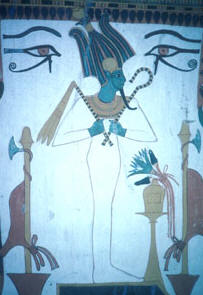 Throughout the millennia, human beings have developed a mythos around the seemingly impossible hope of resurrection. It is a brave hope, a desire to overcome the ever nearing reality of the grave. The Sumerians who created the world's first civilization told the story of Dumuzi, a fertility god who was carried off to the underworld during the hot Summer months, only to rise again at the autumnal equinox. The mythology of the Egyptians describe the brutal murder of Osiris, his descent to the underworld, and his eventual resurrection and establishment of the god of afterlife. The Greeks held that Dionysus experienced a resurrection of sorts, as did the Persian Mithras. Polynesian legends speak of a divine eel that gave up its life, only to rise again as a coconut tree so that the islanders would be provided with sustenance.
Throughout the millennia, human beings have developed a mythos around the seemingly impossible hope of resurrection. It is a brave hope, a desire to overcome the ever nearing reality of the grave. The Sumerians who created the world's first civilization told the story of Dumuzi, a fertility god who was carried off to the underworld during the hot Summer months, only to rise again at the autumnal equinox. The mythology of the Egyptians describe the brutal murder of Osiris, his descent to the underworld, and his eventual resurrection and establishment of the god of afterlife. The Greeks held that Dionysus experienced a resurrection of sorts, as did the Persian Mithras. Polynesian legends speak of a divine eel that gave up its life, only to rise again as a coconut tree so that the islanders would be provided with sustenance. 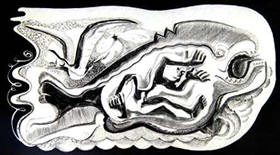 The entombment of Christ is often compared metaphorically with an earlier biblical story, that of Jonah. In the book of Jonah, the prophet is swallowed by a whale due to his refusal to obey God. What is the significance of Jonah in the belly of the whale? Well, the belly is where digestion takes place. One substance is destroyed, broken down, and through this transformation, the substance is converted to energy. The tomb in ancient times was viewed in much the same way. The term "sarcophagus" literally means "flesh eater" because what was temporal wasted away in the tomb.
The entombment of Christ is often compared metaphorically with an earlier biblical story, that of Jonah. In the book of Jonah, the prophet is swallowed by a whale due to his refusal to obey God. What is the significance of Jonah in the belly of the whale? Well, the belly is where digestion takes place. One substance is destroyed, broken down, and through this transformation, the substance is converted to energy. The tomb in ancient times was viewed in much the same way. The term "sarcophagus" literally means "flesh eater" because what was temporal wasted away in the tomb. When the disciples of Jesus went to his tomb early Sunday morning, they found it empty. He had risen. Death had been overcome. Likewise, Jonah was vomited out on the shore, a changed man. The belly of the whale had digested the old self and had created a new man. The resurrection of Jesus pierced the veil that separated the temporal and the eternal, creating a way for humanity to partake in the same transformation that poets, prophets, storytellers, and nature itself expressed in epics, oracles, and the germinating seed.
When the disciples of Jesus went to his tomb early Sunday morning, they found it empty. He had risen. Death had been overcome. Likewise, Jonah was vomited out on the shore, a changed man. The belly of the whale had digested the old self and had created a new man. The resurrection of Jesus pierced the veil that separated the temporal and the eternal, creating a way for humanity to partake in the same transformation that poets, prophets, storytellers, and nature itself expressed in epics, oracles, and the germinating seed.  Teenage relationships that are passionate, move fast, and lead to heartache and ruin. Just as Odysseus washed ashore on the island of Calypso, wounded and in pain, many adolescents run to the arms of the opposite sex for solace, a shelter in the midst of life’s storms. In essence, they end up seeking answers to their heart’s deep questions in another person. This is a recipe for disaster.
Teenage relationships that are passionate, move fast, and lead to heartache and ruin. Just as Odysseus washed ashore on the island of Calypso, wounded and in pain, many adolescents run to the arms of the opposite sex for solace, a shelter in the midst of life’s storms. In essence, they end up seeking answers to their heart’s deep questions in another person. This is a recipe for disaster. 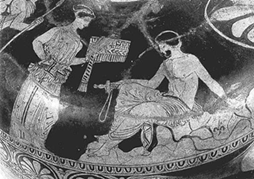 The way adolescent boys end up running to girls as their source of healing and life’s answers can look a little different. A teenage boy may become subservient to a girl, catering to her every whim, just as Odysseus was made prisoner to Calypso. The girl may become more demanding and bossy and begin to look down upon her boyfriend for his neediness and lack of courage to stand up to her. This is typically because what drew her to the boy in the first place was his strong, untamed nature. Deep down, she isn’t looking for someone who needs her, she is hoping for someone who wants her. This may appear to be a subtle difference, but it is very significant. She will push and push, actually hoping to prod the boy into standing up to her demands. This may sound odd, but it occurs frequently.
The way adolescent boys end up running to girls as their source of healing and life’s answers can look a little different. A teenage boy may become subservient to a girl, catering to her every whim, just as Odysseus was made prisoner to Calypso. The girl may become more demanding and bossy and begin to look down upon her boyfriend for his neediness and lack of courage to stand up to her. This is typically because what drew her to the boy in the first place was his strong, untamed nature. Deep down, she isn’t looking for someone who needs her, she is hoping for someone who wants her. This may appear to be a subtle difference, but it is very significant. She will push and push, actually hoping to prod the boy into standing up to her demands. This may sound odd, but it occurs frequently.

